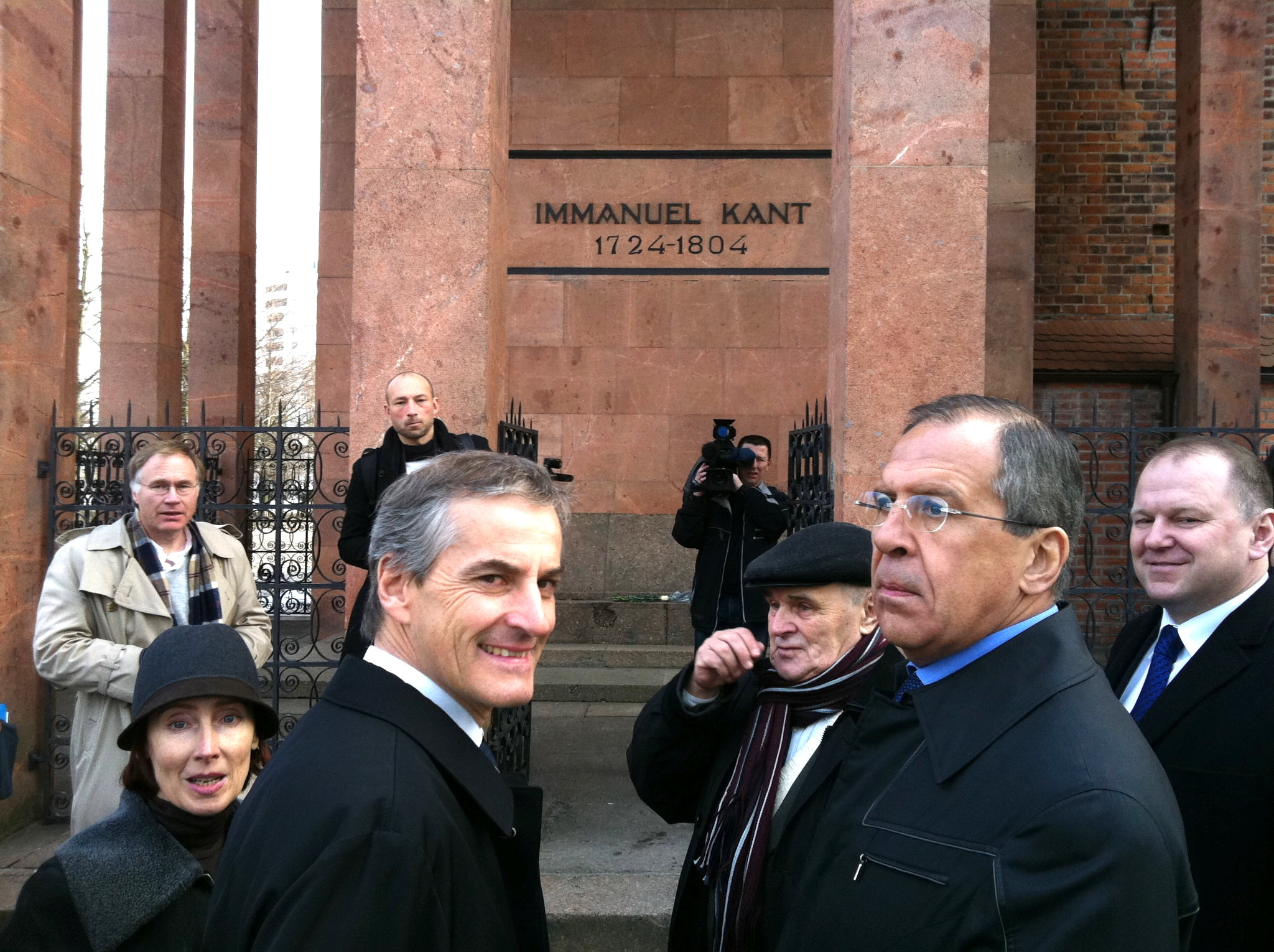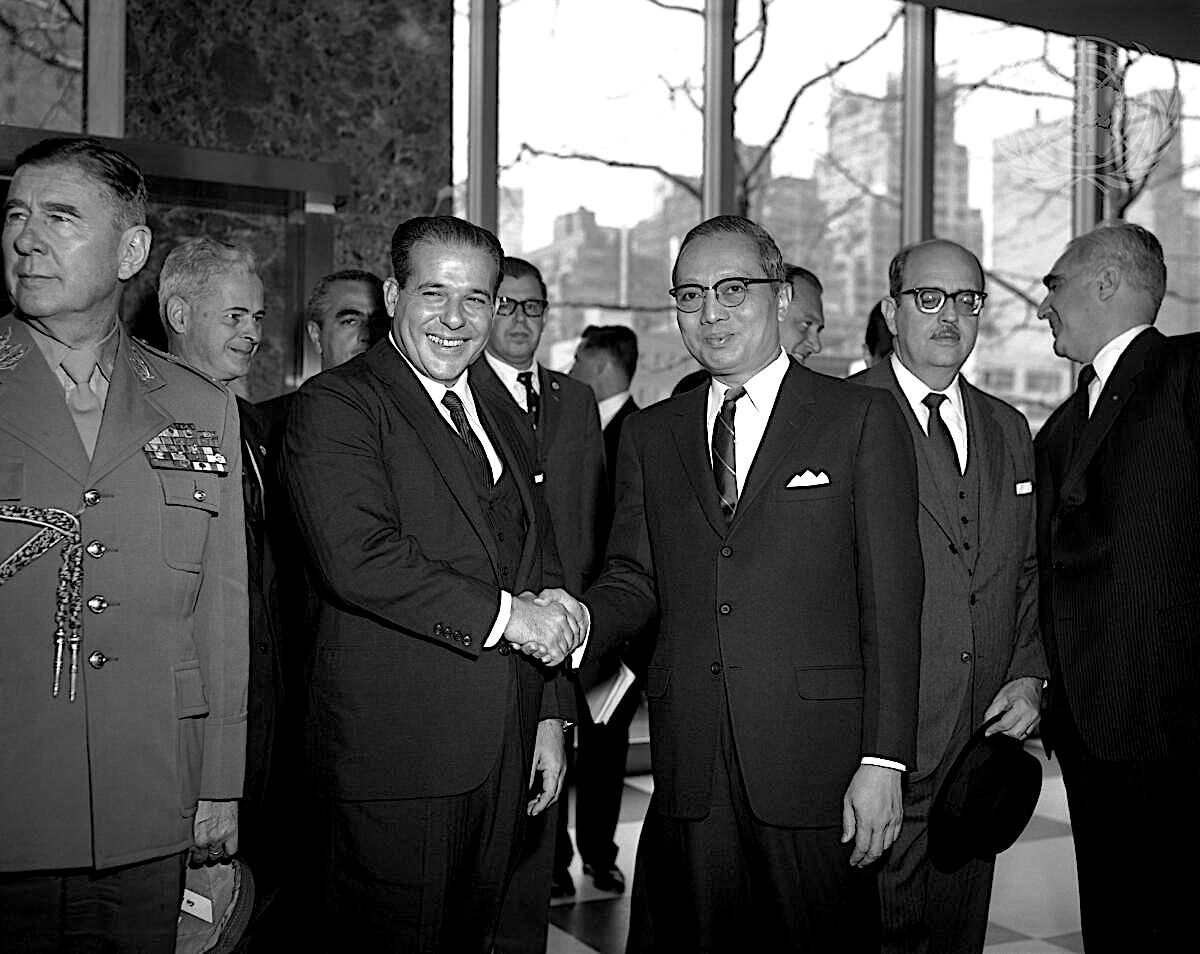An extensive and historically unprecedented set of international institutions offer invaluable tools for pursuing what Immanuel Kant called a “federation of free states,” writes Jeffrey Sachs.

“Good Defeats Evil” statue by Zurab Tsereteli outside U.N. headquarters in New York, 2012. (UN Photo/Rick Bajornas)
By Jeffrey D. Sachs
Common Dreams
Next year will mark the 230th anniversary of Immanuel Kant’s celebrated essay on “Perpetual Peace” (1795). The great German philosopher put forward a set of guiding principles to achieve perpetual peace among the nations of his day.
As we grapple with a world at war, and indeed at dire risk of nuclear Armageddon, we should build on Kant’s approach for our own time. An updated set of principles should be considered at the United Nations Summit of the Future in September.
Kant was fully aware that his proposals would face the skepticism of “practical” politicians:
“The practical politician assumes the attitude of looking down with great self-satisfaction on the political theorist as a pedant whose empty ideas in no way threaten the security of the state, inasmuch as the state must proceed on empirical principles; so the theorist is allowed to play his game without interference from the worldly-wise statesman.”
Nonetheless, as historian Mark Mazower noted in his magisterial account of global governance, Kant’s was a “text that would intermittently influence generations of thinkers about world government down to our own day,” helping to lay the groundwork for the United Nations and international law on human rights, the conduct of war, and arms control.
Kant’s core proposals centered on three ideas.
First, he rejected standing armies. Standing armies “incessantly menace other states by their readiness to appear at all times prepared for war.” In this, Kant anticipated by a century and a half the famous warning by U.S. President Dwight D. Eisenhower of the dangers of a military-industrial complex.
Second, Kant called for non-interference in the internal affairs of other nations. In this, Kant inveighed against the kind of covert operations that the U.S. has used relentlessly to topple foreign governments.
Third, Kant called for a “federation of free states,” which in our time became the United Nations, a “federation” of 193 states pledged to operate under the U.N. Charter.
Kant put great hopes on republicanism as opposed to one-person rule as a check on war-making. Kant reasoned that a single ruler would readily succumb to the temptation of war:
“…a declaration of war is the easiest thing in the world to decide upon, because war does not require of the ruler, who is the proprietor and not a member of the state, the least sacrifice of the pleasures of his table, the chase, his country houses, his court functions, and the like. He may, therefore, resolve on war as on a pleasure party for the most trivial reasons, and with perfect indifference leave the justification which decency requires to the diplomatic corps who are ever ready to provide it.”
By contrast, according to Kant:
“…if the consent of the citizens is required in order to decide that war should be declared (and in this [republican] constitution it cannot but be the case), nothing is more natural than that they would be very cautious in commencing such a poor game, decreeing for themselves all the calamities of war.”
Kant was far too optimistic about the ability of public opinion to constrain war-making. Both the Athenian and Roman republics were notoriously belligerent. Britain was the 19th century’s leading democracy, but perhaps its most belligerent power. For decades, the U.S. has engaged in non-stop wars of choice and violent overthrows of foreign governments.
Three Reasons Kant Got This Wrong

Norwegian President Jonas Gahr Støre, then foreign minister, and Russia’s Foreign Minister Sergei Lavrov on March 7, 2011, in front of the grave of the philosopher Immanuel Kant in the cathedral in Kaliningrad. (Utenriksdepartementet UD, Flickr, CC BY-ND 2.0)
There are at least three reasons why Kant got this wrong.
First, even in democracies, the choice to launch wars almost always lies with a small elite group who are in fact largely insulated from public opinion.
Second, and equally important, public opinion is relatively easy to manipulate through propaganda to stir the public backing for war.
Third, the public can be insulated in the short term from the high costs of war by financing war through debt rather than taxation, and by relying on contractors, paid recruits, and foreign fighters rather than conscription.
Kant’s core ideas on perpetual peace helped move the world toward international law, human rights, and the decent conduct in war (such as the Geneva Conventions) in the 20th century.
Yet despite the innovations in global institutions, the world remains dreadfully far from peace. According to the Doomsday Clock of the Bulletin of Atomic Scientists, we are 90 seconds to midnight, closer to nuclear war than at any time since the clock’s introduction in 1947.
The global apparatus of the U.N. and international law has arguably prevented a third world war to date. U.N. Secretary-General U Thant, for example, played a vital role in peacefully resolving the 1962 Cuban Missile Crisis. Yet the U.N.-based structures are fragile and in need of an urgent upgrade.

April 6, 1962: Brazilian President Joao Goulart, second from left, with U.N. Secretary General U Thant. (UN, Marvin Bolotsky)
For this reason, I urge that we formulate and adopt a new set of principles based on four key geopolitical realities of our time.
Four Key Geopolitical Realities
First, we are living with the nuclear Sword of Damocles over our heads. President John F. Kennedy put it eloquently 60 years ago in his famous Peace Speech, when he declared:
“I speak of peace because of the new face of war. Total war makes no sense in an age where great powers can maintain large and relatively invulnerable nuclear forces and refuse to surrender without resort to those forces. It makes no sense in an age where a single nuclear weapon contains almost 10 times the explosive force delivered by all the allied air forces in the Second World War.”
Second, we have arrived at true multipolarity. For the first since the 19th century, Asia has overtaken the West in economic output. We are long past the Cold War era in which the U.S. and Soviet Union dominated, or the “unipolar moment” claimed by the U.S. after the demise of the Soviet Union in 1991.
The U.S. is now one of several superpowers, including Russia, China, and India, with several regional powers as well (including Iran, Pakistan, and North Korea). The U.S. and its allies cannot unilaterally exact their will in Ukraine, the Middle East, or the Indo-Pacific region. The U.S. must learn to cooperate with the other powers.
Third, we now have an extensive and historically unprecedented set of international institutions for formulating and adopting global goals (e.g., regarding climate, sustainable development, and nuclear disarmament), adjudicating international law, and expressing the will of the global community (e.g., in the U.N. General Assembly and U.N. Security Council). Yes, these international institutions are still weak when the great powers choose to ignore them, yet they offer invaluable tools for building a true federation of nations in Kant’s sense.

Corridor at U.N. headquarters in New York in September 2023 during a General Assembly debate. (UN Photo/Mark Garten)
Fourth, humanity’s fate is more tightly interconnected than ever. Global public goods — sustainable development, nuclear disarmament, protection of the Earth’s biodiversity, prevention of war, pandemic prevention and control — are far more central to our shared fate than at any previous time in human history. Again, we can turn to JFK’s wisdom, which rings as true today as then:
“So let us not be blind to our differences, but let us also direct attention to our common interests and the means by which those differences can be resolved. And if we cannot end now our differences, at least we can help make the world safe for diversity. For in the final analysis, our most basic common link is that we all inhabit this small planet. We all breathe the same air. We all cherish our children’s futures. And we are all mortal.”
Ten Principles, Five From China
What principles should we adopt in our time that could contribute to perpetual peace? I propose 10 Principles for Perpetual Peace in the 21st Century, and invite others to revise, edit, or make their own list.
The first five of my principles are the Principles of Peaceful Coexistence proposed by China 70 years ago and subsequently adopted by the Non-Aligned nations. These are:
1. Mutual respect of all nations for the territorial integrity and sovereignty of other nations;
2. Mutual non-aggression of all nations towards other nations;
3. Mutual non-interference by all nations in the internal affairs of other nations (such as through wars of choice, regime change operations, or unilateral sanctions);
4. Equality and mutual benefits in the interactions among nations; and
5. Peaceful co-existence of all nations.
To implement these five core principles, I recommend five specific principles of action:
6. The closure of overseas military bases, of which the U.S. and U.K. have by far the largest number.
7. The end of covert regime-change operations and unilateral coercive economic measures, which are grave violations of the principle of non-interference in the internal affairs of other nations. (Political scientist Lindsey O’Rourke has carefully documented 64 U.S. covert regime-change operations during 1947-1969, and the pervasive destabilization caused by such operations.)
8. Adherence by all nuclear powers (U.S., Russia, China, U.K., France, India, Pakistan, Israel and North Korea) to Article VI of the Nuclear Non-Proliferation Treaty:
“All Parties must pursue negotiations in good faith on effective measures relating to the cessation of the nuclear arms race and to nuclear disarmament, and on a treaty on general and complete disarmament under strict and effective international control.”
9. The commitment by all countries “not to strengthen their security at the expense of the security of other countries,” (as per the OSCE Charter). States will not enter into military alliances that threaten their neighbors, and commit to resolve disputes through peaceful negotiations and security arrangements backed by the United Nations Security Council.
10. The commitment by all nations to cooperate in protecting the global commons and providing global public goods, including fulfillment of the Paris climate agreement, the Sustainable Development Goals and reform of U.N. institutions.
Today’s great power confrontations, notably the U.S. conflicts with Russia, China, Iran, and North Korea, are largely due to America’s continued pursuit of unipolarity via regime change operations, wars of choice, unilateral coercive sanctions, and the global network of U.S. military bases and alliances.
The 10 principles listed above would help to move the world to peaceful multilateralism governed by the U.N. Charter and the international rule of law.
Jeffrey D. Sachs is a university professor and director of the Center for Sustainable Development at Columbia University, where he directed The Earth Institute from 2002 until 2016. He is also president of the U.N. Sustainable Development Solutions Network and a commissioner of the U.N. Broadband Commission for Development.
This article is from Common Dreams.
Views expressed in this article and may or may not reflect those of Consortium News.

Jeffrey Sachs interviewed by Nathan Robinson, Editor-in-Chief, Current Affairs magazine
hxxps://www.youtube.com/watch?v=actLjLP10Wg
A lot of what Sachs discusses here ultimately hinges on American public opinion. The general public here in my country is browbeaten daily with demonization and scare stories pertaining to all of the sovereign countries and independent leaders across the globe.
Try to get one good word in edgewise about Putin, and stand back in awe at the mockery, scorn and arrogant dismissal you’ll receive. They know it all bc NPR, the Times, CNN, PBS News Hour and Maddow told them so.
I don’t agree with writer but have much respect for his goal. I prefer Kant. This is the discussion that should be every headline, every day in our modern media. Propaganda does not rule. People do and most people just stay in their lane and share opinions with people, not propaganda machines (as it should be). Promote Peace, but don’t necessarily expect it. (As I taught my kids: Be fair but, don’t expect life to be fair). Keep Hope alive. Work hard at what you choose to do.
I found his book “To move the world: JFK’s quest for peace” to be very inspiring.
Of course, the Partial Test Ban Treaty which JFK championed did not do a huge amount but the really important thing is to get started. Once you get started, you can then build on that success.
The very first thing that needs to happen is to clear the halls of congress, the Whitehouse and the supreme court. The second is to get rid of delegates, super delegates, electoral college and Super PACs. Third, instate a voting system that works – such as Ranked Choice Voting. Fourth no outside money to elected officials, they are elected to serve the people, not corporations, special interest groups, or any other outside influence. Finally, term limits for ALL – no more sleeping in their chairs at our expense…
It is said that Alcoholics Anonymous is not for people who need it but for people who want it. That the U.S. ruling class would swear off aggression as its modus vivendi with everybody else before reaching anything resembling rock bottom seems a pleasant fantasy. Let us begin with U.S. politicians, diplomats, and media speaking the truth at least some of the time and start chipping away at U.S. militarism at that point.
Thank you, Jeffrey Sachs, for providing a set of guidelines for co-operation between nations. Presently there is too much useless finger pointing and hand wringing. The common people of the planet need to be able to gather around a set of simple principles with which to demand a positive future.
You’d have to break up the US into at least 3 parts to even begin this conversation. The first goal of US elites is and has been to silence and enslave US taxpayers. Endless wars is the way they do this. “The Deep State…considers global conflict as the price to pay for maintaining its largesse from the US taxpayer. Continuous warfare is its only business product.”…Philip Giraldi, 11/7/2019. On April 4, 1967 Dr. King led a march to the UN to urge its members to stop US war in Vietnam. Media was outraged at Dr. King for this. Exactly one year later, April 4, 1968, Dr. King was murdered. Then you have people who are simply insecure. Longtime US insider Zbigniew Brzezinski in late 1990s said US would fade from relevance unless NATO continued its global aggression.
Also in 1967, James Earl Ray tricked into escaping from prison so that he could be framed for Martin Luther King’s forthcoming assassination.
I believe 80% of humankind would readily agree with these ten points. I also believe that BRICS+ is moving, slowly but surely, to fulfill these points. All of us just need to put our shoulders to the wheel in whatever area of concern is addressed by any of these points. In my case, I work on the abolition of nuclear weapons. Perhaps there is also a lot to be learned from past treaties that have “worked” in the past, in reducing violence and war.
First and foremost I want to make it clear that I have the highest respect for Jeffrey Sachs. However, after watching yesterday’s disgraceful performance of our jumping jack legislators making fools of themselves by their witless endorsement of every absurd distortion of the truth uttered by by the Prime Minister of Israel, I can only conclude that the probability of a nuclear Armageddon far outweighs the possibility of Perpetual Peace.
Excellent! Thank you.
I suggest that there is an 11th necessary requirement for permanent peace: that there can be no wealthy class. Allowing individual people, who may not be mentally stable or grounded, to possess tens or hundreds of billions of dollars is guaranteed to cause disruptions, disputes and even wars over access to resources, markets and labor forces. We will never have peace as long as there are billionaires. Further, billionaires hoard money, leaving less for workers, which drives unrest. If you want peace for all time, you need to eliminate the ultra-rich for all time.
You beat me to it. All wars are banker wars. Capitalism requires war to force the inhabitants of countries that possess resources the ruling class covets to suffer extreme poverty and violent repression. We need an overhaul of our value system.
The value system that proudly proclaims “war is good for business” is what needs to be thrown out.
I’d throw out capitalism as well, for good measure. Isn’t the Boeing Airlines debacle proof that capitalism requires profit over safety?
This is why we need Academics.
Professor Sachs gives us an actionable plan to get out of this mess.
So how do we implement it?
The first thing we could do is identify every neoconservative politician that even brushed their hands together for Netanyahu yesterday and vote them out. That’s something we could all take part in. It would also give us a sense of unity and purpose.
The rest of it would follow.
But it’s going to be a real Donnybrook.
This manifesto of peace should be adopted by all nations. Nuclear war is on the lips of many of our leaders; this is wrong. The very thought of war inches us that much further to a holocaust. The talk of peace should move us in the other direction.